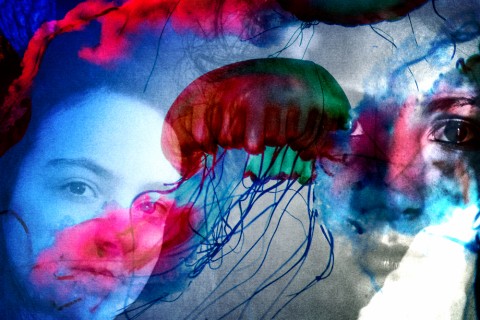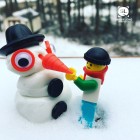On our way home from the beach, my mother parks the car in the gravel parking lot of an ice-cream shop. When she returns with three Band-Aid colored cones topped with chocolate mint, my sister is hanging halfway out her window to intercept her treat. I accept one of the cones, but I don’t thank my mother, and she doesn’t demand I do. We eat the ice cream in the car, my skin stinging where dozens of jellyfish tentacles caressed my limbs as I swam back to shore from what seemed like a mile out. The current carried me away on the little pea green raft I won in a coloring contest. I had to ditch my prize to break free of the current’s pull. My mother doesn’t say she’s sorry I almost drifted out to sea. She doesn’t say she’s sorry she wasn’t watching me. Or that it’s time she learns how to swim. She says, “Good chocolate chip to ice cream ratio in this.”
*
When my mother returns from the grocery store, kids from the neighborhood hover like seagulls as we help her unload the trunk full of heavy bundles, each double-bagged. She unveils her purchases like a returned traveler showing her souvenirs. “These were on clearance.” “This I’ve never seen before, but the cashier said they’re delicious.” When she empties plastic bags of miniature chocolate bars into the silver candy bowl, my sister sifts the candy between her fingers like the seashells she brings home in a red pail every trip to the beach. The neighbor kids stare at the bowl. When my mother says, “Help yourselves,” I watch from the doorway as they swoop.
*
“My childhood was terrible. You can’t imagine how terrible,” my mother says. Although I know from my father that my mother has four siblings and that her parents are still married and living in the same house she grew up in, always I imagine just my mother and her mother, nobody else. They live by the sea in a house made of candy that my mother isn’t allowed to eat. Her mother warns that removing just one peppermint or gumdrop could bring the whole house down and that if the house falls, they’ll be ravaged by the sea.
*
The morning I am almost dragged out to sea, a woman hauls crabs up out of the ocean in a wire cage, minutes after I beach. The crabs don’t move inside the wire box behind her, as though they are content being caught or, otherwise, already dead, though I know they’re not. Always my mother drops them into the boiling water alive.
*
Years later, my mother returns the little blue reply card to say she won’t be able to attend my wedding. It’s accompanied by a heavy package, like those she sent me when I was in college, despite how many times I explained that the distance between the school post office and my dorm room was over a mile and that I had to carry those packages on foot. In contrast to the sticky baklava and tins of chocolate covered pretzels in the college packages, this package contains a set of serving bowls painted with brown and blue nautilus shells.
*
I spend the night on a beach in Bolivar with a girlfriend and a couple of boys we meet on the Galveston Strand. When I enter the back door in the morning, sand sticking to my legs, my mother is in the kitchen, but she doesn’t look at me, doesn’t ask where I’ve been. Years later she says to my husband, the one time she meets him, “She was always an independent kid. She never needed me.”
*
The woman with the crabs stops and stares at me and at my mother in her jean shorts and faded red T-shirt. My mother doesn’t own a swimsuit. The woman says, “This beach is no place for kids with a mother who doesn’t know how to swim. You should take those girls down to the lifeguarded beaches.” Through the woman’s blue cover-up shows the softness of her breasts and belly and hips.
*
I’ve never seen my mother naked. This strikes me as odd now that I’m a mother. My kid sees me naked all the time. She brushes her teeth in my bathroom. She begs to take bubble baths together. She reaches up underneath the sleeves of my shirts to rub my arms as though with enough effort, a genie will emerge from my fingertips.
*
I wonder: if I could travel back in time and mother my mother, would everything have turned out different? If someone had hugged her and tenderly brushed her hair and said to her, “I would swim across the ocean for you,” maybe she wouldn’t say to me now, “You’ll never know how much I love you.”
*
When I emerge from the ocean that morning, I lie on the sand like a beached whale. When I look up from my mother’s white sneakers and fuzzy peach ankle socks, I see she is frightened. What she says is “I’ll pour salt water on you to take some of the sting out.” She borrows my sister’s red pail and runs back and forth between me and the sea. Like a child determined to fill a moat around a sand castle, only to find upon each new return that the sand’s appetite is greater than she thought possible.

Notes from Guest Reader Christopher James
If stories could start fires, this one might burn down half the library. The characters are all beautifully imperfect, especially that mother, and I never thought someone could wring such a strong response from me with the ratio of chocolate chip to ice-cream.


 The core workshop of SmokeLong Fitness is all in writing, so you can take part from anywhere at anytime. We are excited about creating a supportive, consistent and structured environment for flash writers to work on their craft in a community. We are thrilled and proud to say that our workshop participants have won, placed, or been listed in every major flash competition. Community works.
The core workshop of SmokeLong Fitness is all in writing, so you can take part from anywhere at anytime. We are excited about creating a supportive, consistent and structured environment for flash writers to work on their craft in a community. We are thrilled and proud to say that our workshop participants have won, placed, or been listed in every major flash competition. Community works.